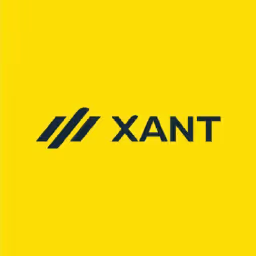Reply Data Alternatives
This guide shares 10 alternatives to Reply Data. We compare each on features, pricing, and data quality to help you make the right choice.

Reply Data is a popular tool for good reason. It performs well if you need a B2B database or a straightforward email finder. Many teams use it for these specific tasks and see good results.
But like any tool, it has some drawbacks. Some users report that contact data can be outdated, while others find the interface complex. We've analyzed the top alternatives to help you decide if switching makes sense. Let's get started.
A Different Approach: 11x Digital Workers
If your team wants to use digital workers for sales tasks, consider 11x. It provides autonomous agents that manage parts of your sales process. This can be a useful option for teams that want to automate certain sales functions.
11x is a GTM platform using AI agents to manage the sales process. One agent, Alice, finds prospects, runs outreach on email and LinkedIn, and keeps the CRM current. A second agent, Julian, qualifies inbound leads and books meetings.
This approach combines capabilities that typically require separate tools. Data enrichment, outreach automation, and email warmup are unified within the platform, removing the need for multiple point solutions.
Reply Data Alternatives
Below, we review the top alternatives to Reply Data. Each review covers main features, pricing, and the specific advantages and disadvantages when compared to Reply's platform.
1) ZoomInfo SalesOS
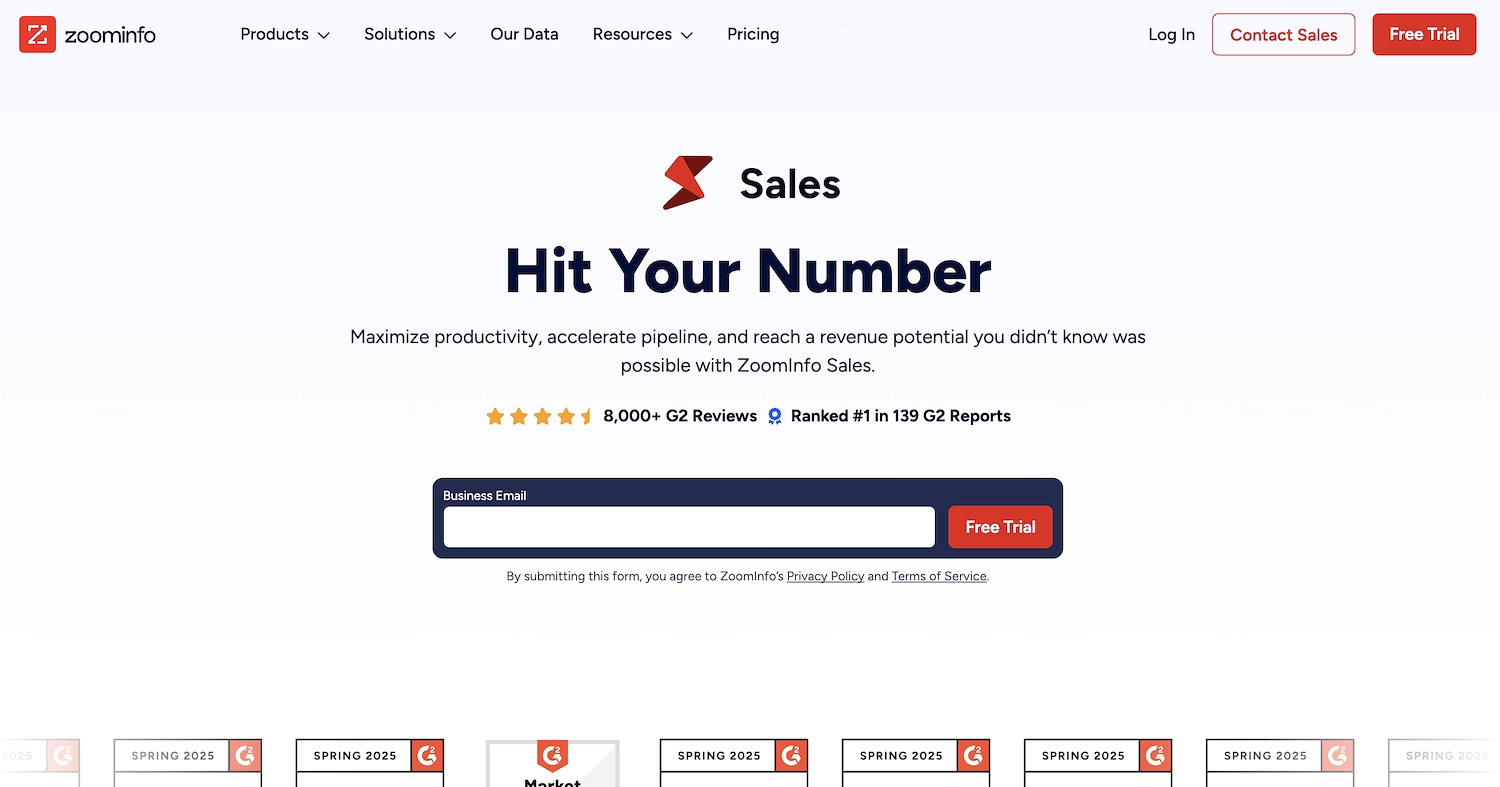
ZoomInfo SalesOS is a go-to-market intelligence platform for B2B organizations. It combines contact and company data with buyer-intent signals and engagement tools into a single system. This provides a unified source of information for sales, marketing, and operations teams.
Teams use the platform to build lead lists with verified contact data and to identify accounts that show intent to buy. It also supports prospecting and campaign launches with its enriched data.
ZoomInfo SalesOS's Main Features
- Identifies prospects ready to buy using real-time intent signals.
- Turns anonymous website page views into pipeline opportunities.
- Analyzes every call and meeting interaction with its conversation intelligence tool.
- Includes a generative-AI companion that surfaces insights and drafts outreach.
ZoomInfo SalesOS vs. Reply Data
Average Review score: 4.5/5 stars based on 8,738 G2 reviews.
- ZoomInfo provides buyer intent signals, which help identify accounts that actively research solutions. This is a more proactive approach compared to Reply Data's database functionality.
- The platform can identify anonymous visitors on your website and turn them into leads. Reply Data does not offer a similar visitor identification feature.
- It includes a conversation intelligence tool that analyzes sales calls and meetings for insights. This feature is absent in Reply Data, which focuses on data provision and email outreach.
- The tool has a generative AI companion that suggests who to contact and what to say. This provides a layer of guidance not found in Reply Data's toolset.
Where ZoomInfo SalesOS Can Fall Short
- ZoomInfo SalesOS typically has a higher cost, which might not fit every budget. Its implementation can take around a month, a longer setup time compared to the more direct approach of Reply Data.
- Its extensive database sometimes contains outdated contact information, according to user reviews. This means teams might need to spend extra time to verify details before they start outreach campaigns.
- The platform's broad feature set might be more than what a team needs. For simple email finding and list building, Reply Data provides a more focused and less complex solution.
Cost and Value Comparison
Reply Data's pricing is available in distinct tiers, whereas ZoomInfo's is custom-quoted and generally higher to account for its wider range of features. Since pricing models can vary, we recommend visiting ZoomInfo's official website for the most accurate information.
2) Apollo.io
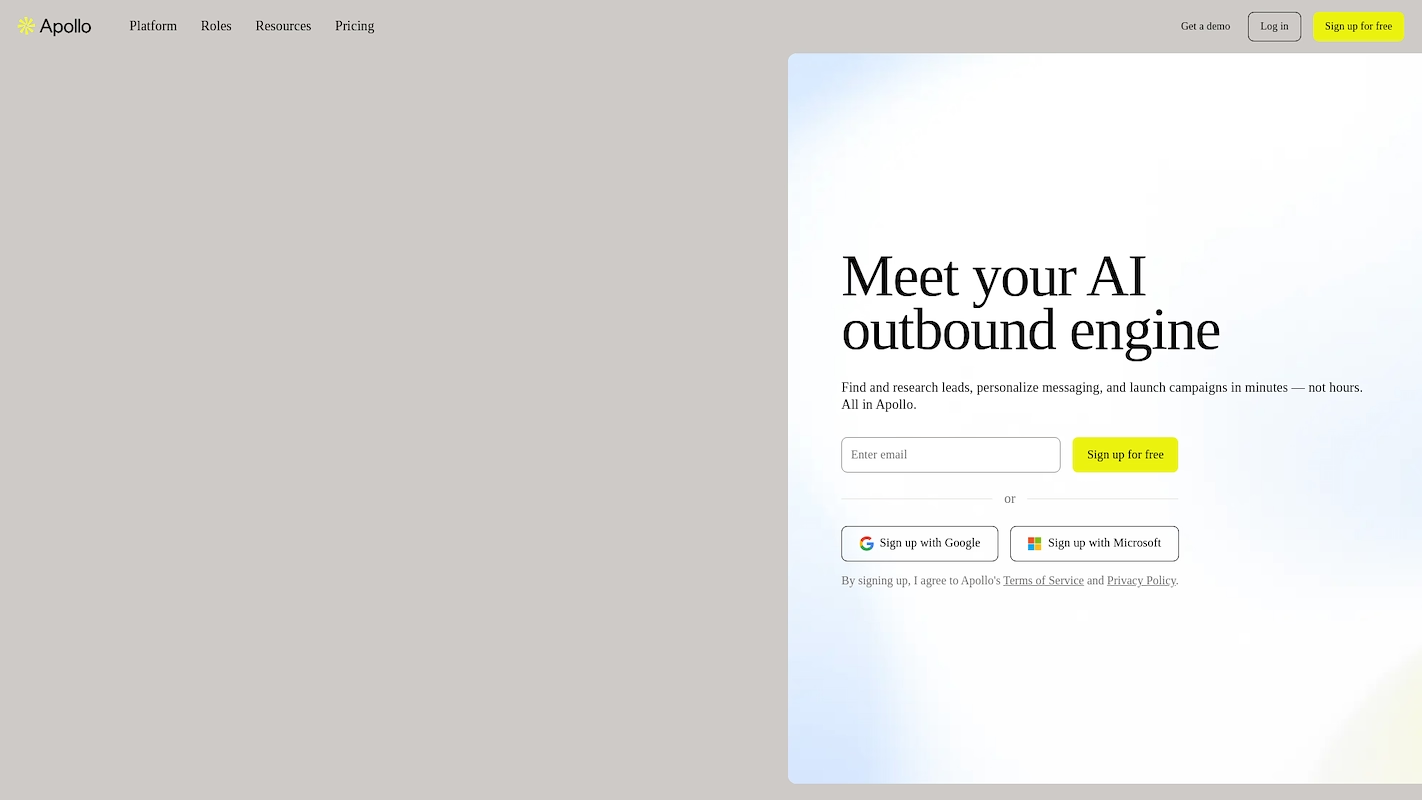
Apollo.io is a sales intelligence platform that provides a B2B database. It contains contact and company data that teams use to build lead lists and find prospect email addresses.
The platform also includes engagement tools for outreach. This combination of data and tools supports sales workflows from the initial contact to a closed deal.
Apollo.io's Main Features
- Provides access to a database of contacts and companies for list building.
- Automates outreach through multi-step email and social media sequences.
- Scores leads based on firmographic data and engagement signals.
- Offers analytics to track the performance of outreach campaigns.
Apollo.io vs. Reply Data
Average Review score: 4.7/5 stars based on 8,904 G2 reviews.
- Apollo.io combines data, engagement tools, and analytics into one platform. This integrated system differs from Reply Data, which concentrates on its database and email finder functions.
- The platform includes a lead scoring feature that uses firmographic and engagement data. This helps teams prioritize prospects, a function not available in Reply Data.
- It provides buyer intent data to help find prospects who actively research solutions. This offers a proactive approach to prospecting compared to Reply Data's contact database.
- A free plan is available, which makes the tool accessible for individuals or small teams. This is different from Reply Data, which structures its access around paid tiers.
Where Apollo.io Can Fall Short
- Some users report that contact data in Apollo.io can be inaccurate. While this issue can also occur with Reply Data, the large scale of Apollo's database may require teams to dedicate more time to data verification.
- The platform's all-in-one design sometimes creates a learning curve. In comparison, Reply Data offers a more focused toolset for email finding, which can be simpler for teams to adopt for specific tasks.
- Its email deliverability features are less specialized than those in Reply Data. Teams that need robust email warmup and management tools might find Reply Data's dedicated functions more suitable for their campaigns.
Cost and Value Comparison
Apollo.io offers a free plan and paid tiers starting at $49 per user, making it a more accessible option for teams with smaller budgets compared to Reply Data's paid-tier structure. For a full breakdown of features at each price point, visit Apollo.io's official website.
3) Lusha
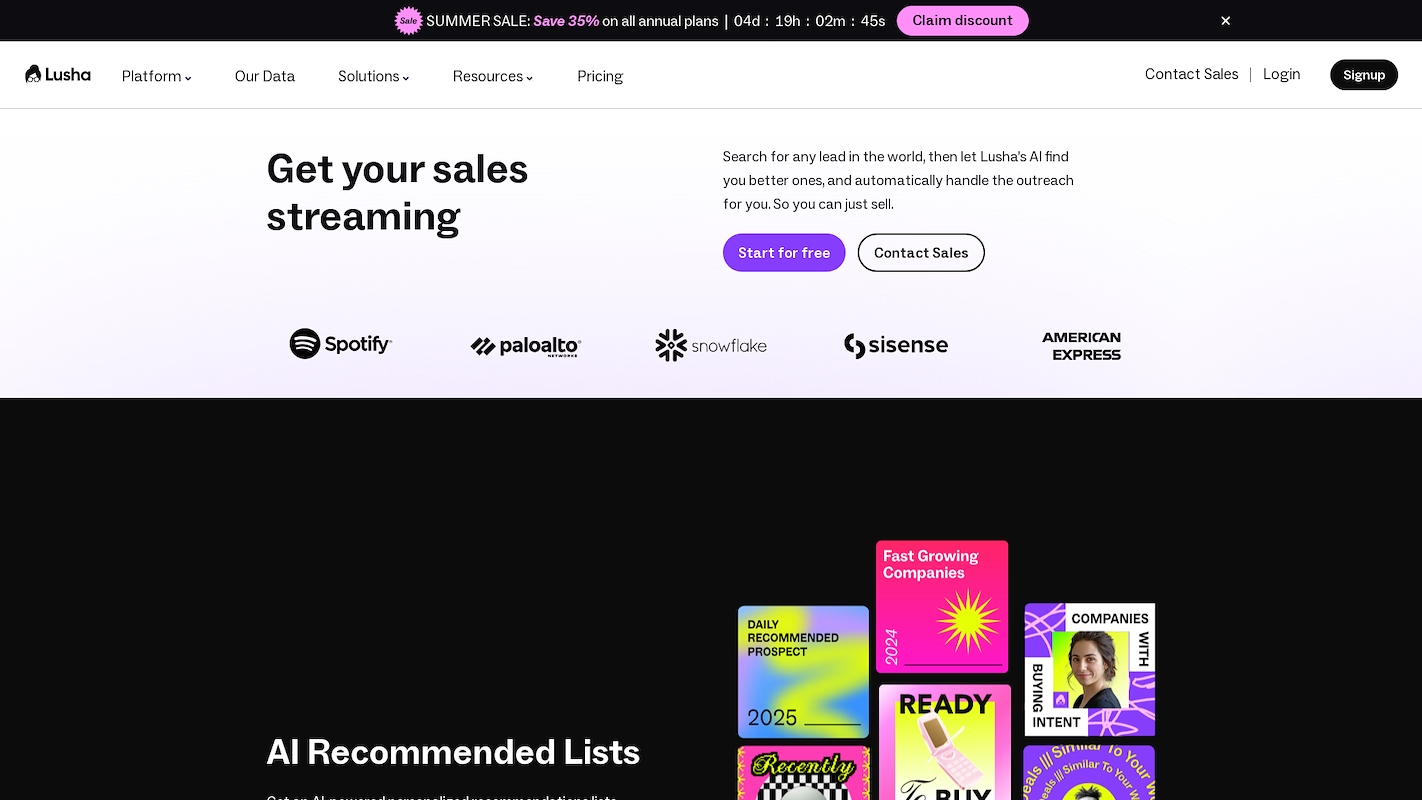
Lusha is a sales intelligence platform. Revenue teams use it to search for B2B leads worldwide and receive AI-generated recommendations for similar prospects. The system automates multichannel outreach within a single workflow.
It emphasizes global data coverage and compliance with standards like GDPR and CCPA. Teams can build accurate prospect lists and keep CRM records current with its data integration capabilities.
Lusha's Main Features
- Identifies in-market buyers and sends real-time notifications about intent triggers.
- Generates live, auto-updating lead lists that add fresh prospects at user-defined intervals.
- Records and analyzes sales meetings.
- Automates personalized email sequences with AI-generated copy.
Lusha vs. Reply Data
Average Review score: 4.3/5 stars based on 1,516 G2 reviews.
- Lusha provides buyer intent signals to identify accounts that actively research solutions. This is a more proactive approach compared to Reply Data's database function.
- The tool generates live lead lists that automatically update with new prospects. This differs from Reply Data, where users typically build static lists for campaigns.
- It automates personalized email sequences with AI-generated copy. Reply Data, in comparison, focuses on data provision and does not include this feature.
- A free plan is available, which makes the platform accessible for individuals. This is different from Reply Data, which structures its access around paid tiers.
Where Lusha Can Fall Short
- Some users report that Lusha's contact information can be outdated. This may require teams to spend additional time to verify data before outreach, a step that is also sometimes necessary with Reply Data.
- The platform's email features focus on AI automation. Compared to Reply Data, it has less specialized tools for email warmup and deliverability management, which can be a factor for large-scale outreach.
- Lusha's plans often operate on a credit system that can limit contact reveals. This is different from Reply Data's tier-based access, which may offer more predictability for teams with high-volume needs.
Cost and Value Comparison
Lusha offers a free plan and paid tiers starting at $36 per user per month, providing an accessible entry point. In contrast, Reply Data uses a paid-tier structure. For the most current pricing, we recommend visiting Lusha's official website.
4) Cognism
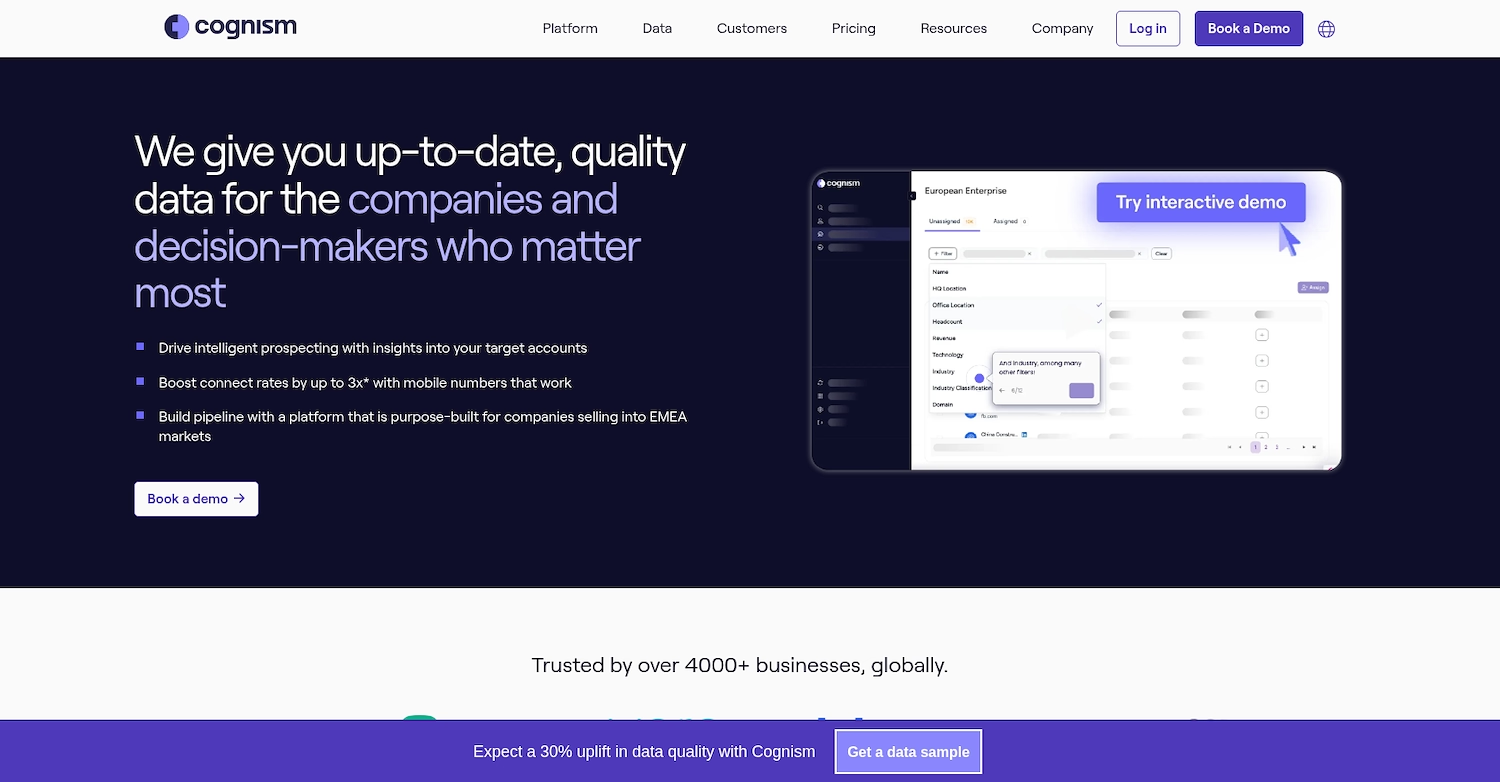
Cognism is a sales intelligence platform with a focus on global B2B data. It provides sales and marketing teams access to company and contact information to build prospect lists. The data is human-verified to ensure accuracy for outreach.
The platform helps companies identify ideal customers and find key contacts within those accounts. It supports prospecting workflows and provides reliable data for business development.
Cognism's Main Features
- Offers extensive coverage of mobile numbers and email addresses for contacts in the UK and EMEA regions.
- Provides phone-verified, human-checked mobile numbers, called Diamond Data®, to increase connect rates.
- Includes a database of VP-level and above decision-makers, screened against Do-Not-Call lists.
- Surfaces buying signals from hiring trends, funding rounds, and technographic changes for timely outreach.
Cognism vs. Reply Data
Average Review score: 4.6/5 stars based on 1,033 G2 reviews.
- Cognism provides phone-verified mobile numbers, known as Diamond Data®, to increase connect rates. This human-verification process is a different approach to data accuracy compared to Reply Data's standard database.
- The platform offers extensive data coverage for contacts in the UK and EMEA regions. This regional focus differs from Reply Data's more general B2B database.
- It screens its database against international Do-Not-Call lists. This provides an extra layer of compliance for outreach campaigns, a feature not highlighted in Reply Data's toolset.
- The tool identifies buying signals from company changes like funding rounds or new hires. This helps teams time their outreach, offering a more dynamic approach than Reply Data's static list-building function.
Where Cognism Can Fall Short
- Cognism's pricing is custom-quoted and generally higher, which may not be suitable for smaller teams. Reply Data, in contrast, offers more predictable costs with its tiered pricing plans.
- The platform's broad feature set can create a learning curve and a longer setup time. For simple list-building, Reply Data offers a more straightforward and quicker solution.
- It does not offer specialized email warmup or deliverability management tools. Teams that focus heavily on email outreach may find Reply Data's dedicated features more effective for their campaigns.
Cost and Value Comparison
While we've covered key features and use cases in this comparison, pricing models can vary significantly between tools. For the most accurate and up-to-date pricing information, we recommend visiting Cognism's official website.
5) Seamless.ai
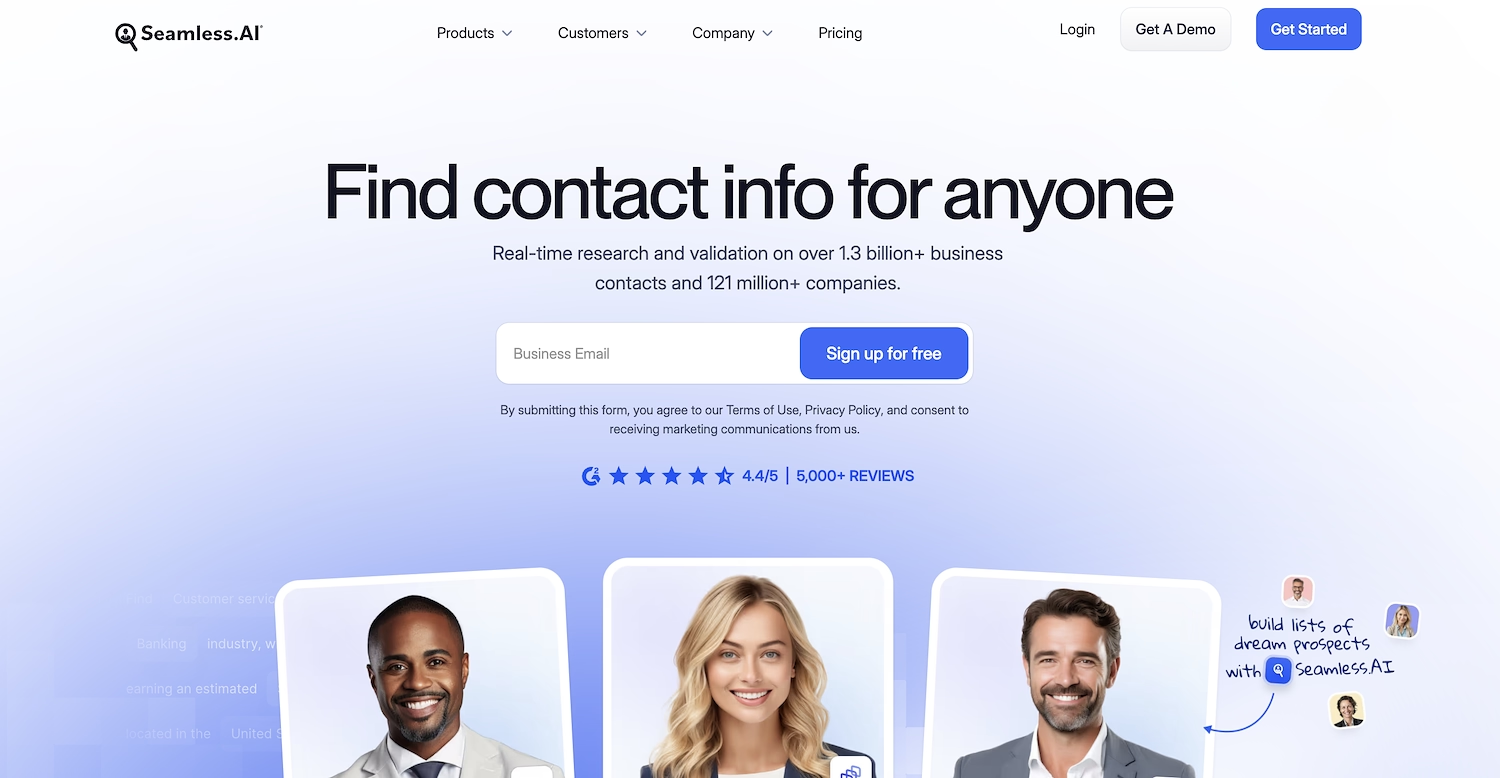
Seamless.ai is a sales intelligence platform with a real-time search engine for its B2B database. Sales and marketing teams use the tool to find verified contact information, such as emails and phone numbers, for prospects.
The system helps users build lists and connect with decision-makers in their target accounts. It provides the data for outreach campaigns.
Seamless.ai's Main Features
- Surfaces prospects based on intent signals to identify those ready to buy.
- Detects and sends alerts when a prospect or customer changes jobs.
- Generates research and personalized messaging for each prospect.
- Automates list-building workflows to maintain a continuous pipeline.
Seamless.ai vs. Reply Data
Average Review score: 4.4/5 stars based on 5,067 G2 reviews.
- Seamless.ai provides buyer intent data to help find prospects who are actively looking for solutions. This is a more proactive approach compared to Reply Data's function as a contact database.
- The tool sends alerts when a contact changes jobs, which creates timely outreach opportunities. Reply Data does not offer a similar job change tracking feature.
- It generates personalized messages for each prospect based on its research. This provides a layer of automation for outreach that is not present in Reply Data's toolset.
- The platform uses a real-time search engine to find contact information, which aims to provide current data. This is different from Reply Data's more traditional database structure.
Where Seamless.ai Can Fall Short
- Some users report that contact data can be inaccurate. While this can also happen with Reply Data, the real-time search function in Seamless.ai sometimes pulls outdated information, which requires extra verification.
- The platform does not have specialized email warmup or deliverability tools. Teams that focus on large-scale email outreach may find Reply Data's dedicated features more effective for their campaigns.
- Seamless.ai uses a credit system that can limit the number of contacts a user reveals. This model may be less predictable for high-volume prospecting compared to Reply Data's tier-based plans.
Cost and Value Comparison
While we've covered key features and use cases in this comparison, pricing models can vary significantly between tools. For the most accurate and up-to-date pricing information, we recommend visiting Seamless.ai's official website.
Final Recommendation: Try 11x
For teams interested in digital workers, 11x offers a different approach. Its autonomous agents manage prospecting, outreach, and CRM updates. This provides a unified system for automating sales functions, which may be a suitable direction for your company.
At 11x, we use AI agents to run your sales playbook. Alice finds prospects and starts outreach, while Julian qualifies leads and books meetings. Our platform combines data, outreach, and warmup, which replaces multiple tools in a traditional GTM stack.
Book a demo to see how 11x works.
6) RocketReach
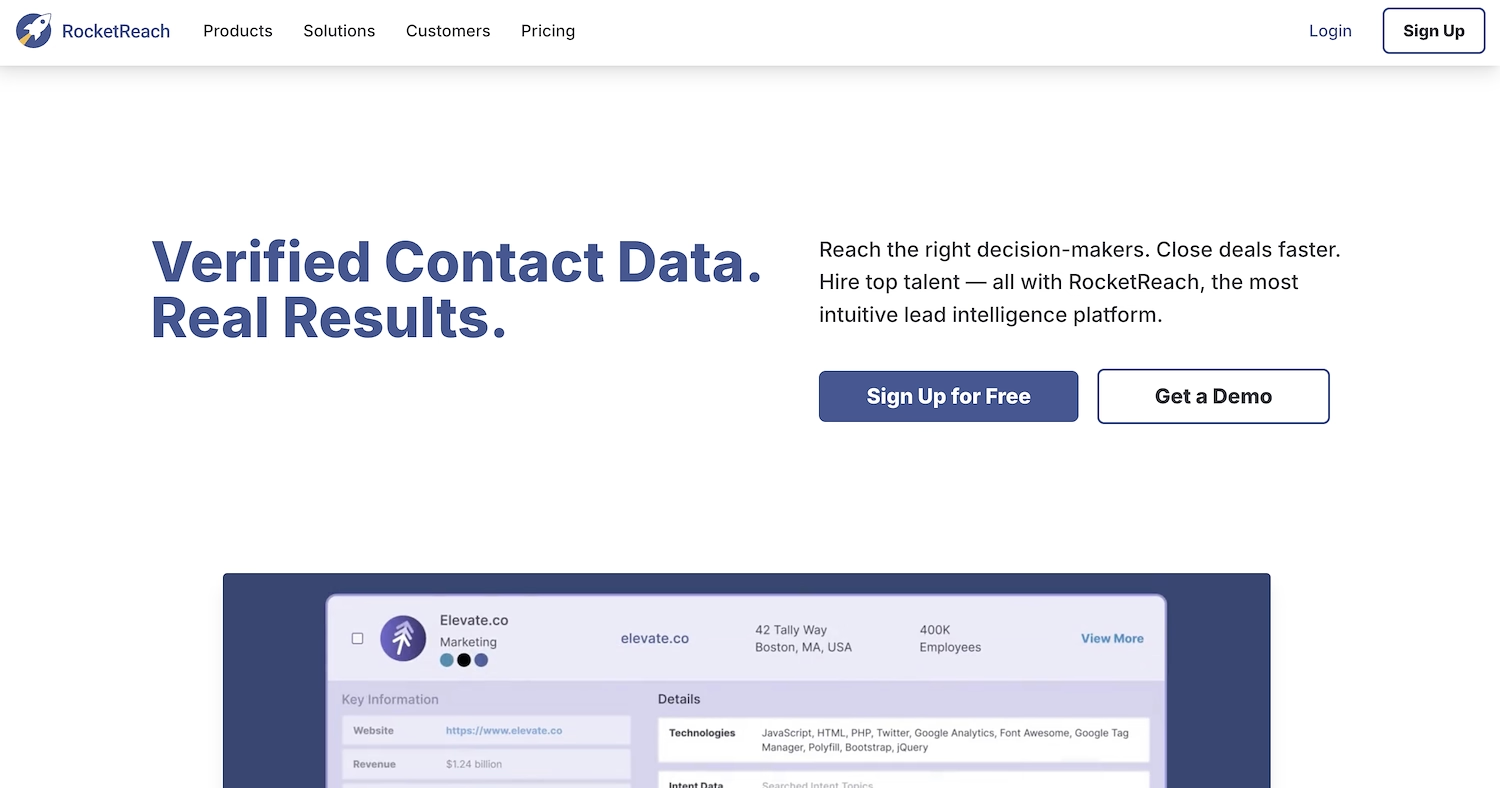
RocketReach is a B2B database with contact information for professionals. Sales, marketing, and recruiting teams use it to look up individuals and companies. The platform provides email addresses and phone numbers, which helps users build prospect lists for outreach.
RocketReach's Main Features
- Provides access to a B2B database with contact information for professionals.
- Includes search tools to look up individuals and companies.
- Supplies email addresses and phone numbers to build prospect lists for outreach.
RocketReach vs. Reply Data
Average Review score: 4.4/5 stars based on 918 G2 reviews.
- RocketReach provides specialized contact data for the healthcare sector. This industry focus is different from Reply Data's general B2B database.
- It offers access to a large database of over 700 million professionals worldwide. This scale is a key difference when compared to Reply Data's database.
- The platform includes intent data, which helps identify prospects who are actively looking for solutions. This is a proactive feature not found in Reply Data's core offering.
- A free plan is available for basic use, offering a few lookups per month. This provides an entry point not available with Reply Data's paid-only structure.
Where RocketReach Can Fall Short
- The platform focuses on providing contact data and integrates with other tools for outreach. It lacks the built-in email warmup and deliverability management features that are a core part of Reply Data's system.
- Its plans operate on a credit system that limits the number of contacts users can access. This model can be less predictable for high-volume teams compared to Reply Data's tier-based pricing structure.
- Some users report that contact information in the database can be outdated. This might require teams to spend extra time on verification before starting outreach campaigns.
Cost and Value Comparison
RocketReach offers a free plan and paid tiers starting at $99 per month for 100 lookups. This credit-based model contrasts with Reply Data's tier-based plans, which may be more predictable for high-volume use. For the most accurate pricing, we recommend visiting RocketReach's official website.
7) UpLead
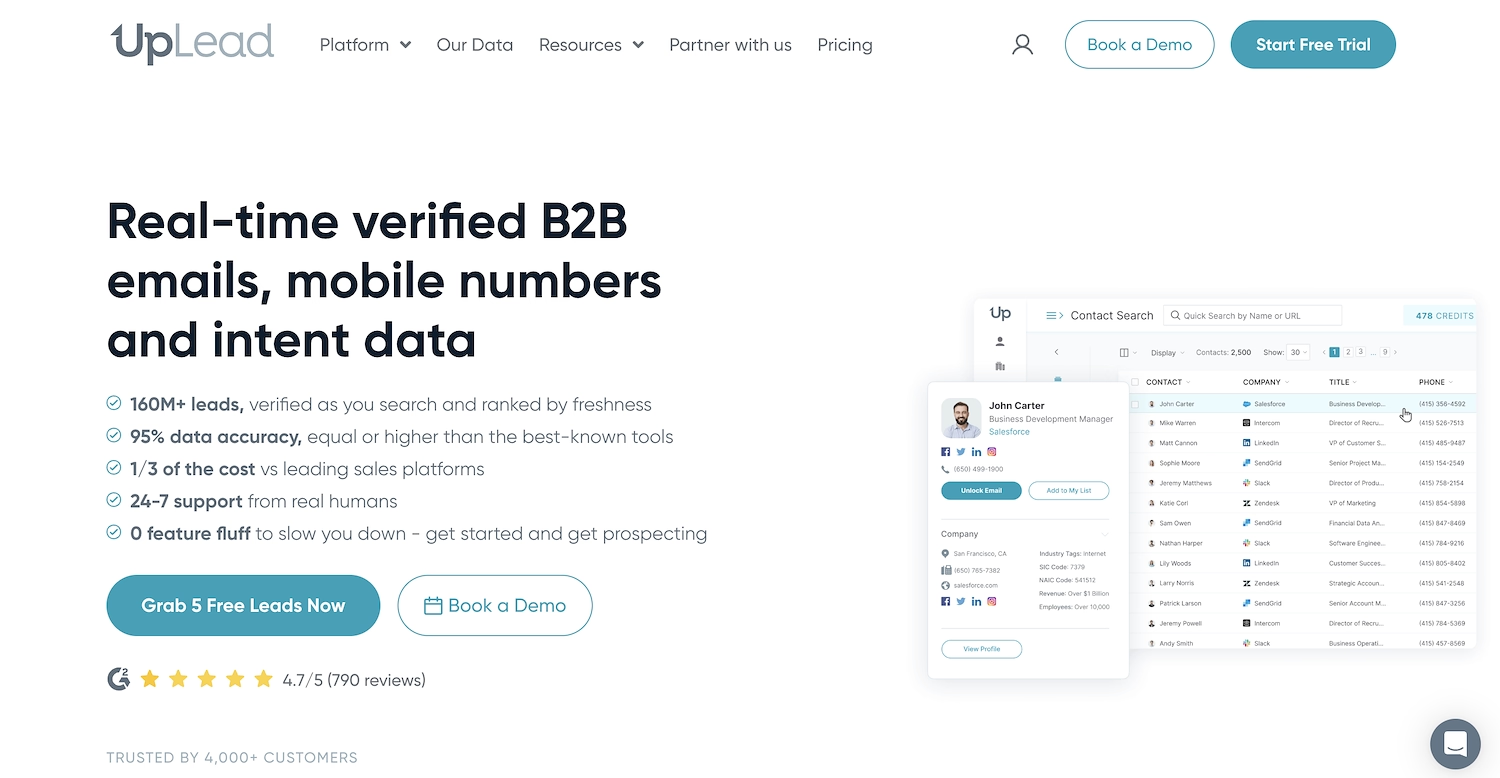
UpLead is a B2B database that provides contact and company profiles. Sales and marketing teams use the platform to build prospect lists with verified data. The system offers real-time email verification to support outreach efforts.
It focuses on data accuracy to help users connect with qualified leads. The platform also includes technographic data to identify companies based on their technology stack.
UpLead's Main Features
- Provides real-time email verification on every export, backed by a 95% accuracy guarantee.
- Identifies companies based on their technology stack by tracking over 16,000 technologies.
- Surfaces prospects who are actively researching solutions through its buyer intent data.
- Enriches CRM records with over 40 data points to prevent data from becoming stale.
UpLead vs. Reply Data
Average Review score: 4.7/5 stars based on 797 G2 reviews.
- UpLead provides a 95% accuracy guarantee on its data with real-time email verification. This is a specific commitment to data quality that differs from Reply Data's standard database.
- The platform includes technographic data, which lets users find companies based on the software they use. Reply Data does not offer this type of technology-based filtering.
- It surfaces buyer intent signals to identify prospects who are actively researching solutions. This is a proactive feature not found in Reply Data's core database function.
- The tool offers a free trial for users to test the platform with a few credits. Reply Data, in comparison, structures its access around paid-only tiers.
Where UpLead Can Fall Short
- UpLead focuses on data provision and lacks the specialized email warmup and deliverability tools that are part of Reply Data's system. This may require teams to use a separate solution for managing large-scale email campaigns.
- The platform's broad feature set might be more than what a team needs for simple list-building. In comparison, Reply Data offers a more focused toolset for email finding, which can be simpler to adopt for specific tasks.
- Its plans operate on a credit system that limits contact lookups. This model can be less predictable for teams with high-volume needs compared to Reply Data's tier-based access, which may offer more consistent costs.
Cost and Value Comparison
UpLead offers a free trial and paid plans starting at $99 per month, providing a lower entry point compared to Reply Data's paid-tier structure. This makes it more accessible for teams that want to test the platform before committing. For the most current pricing, we recommend visiting UpLead's official website.
8) SalesIntel
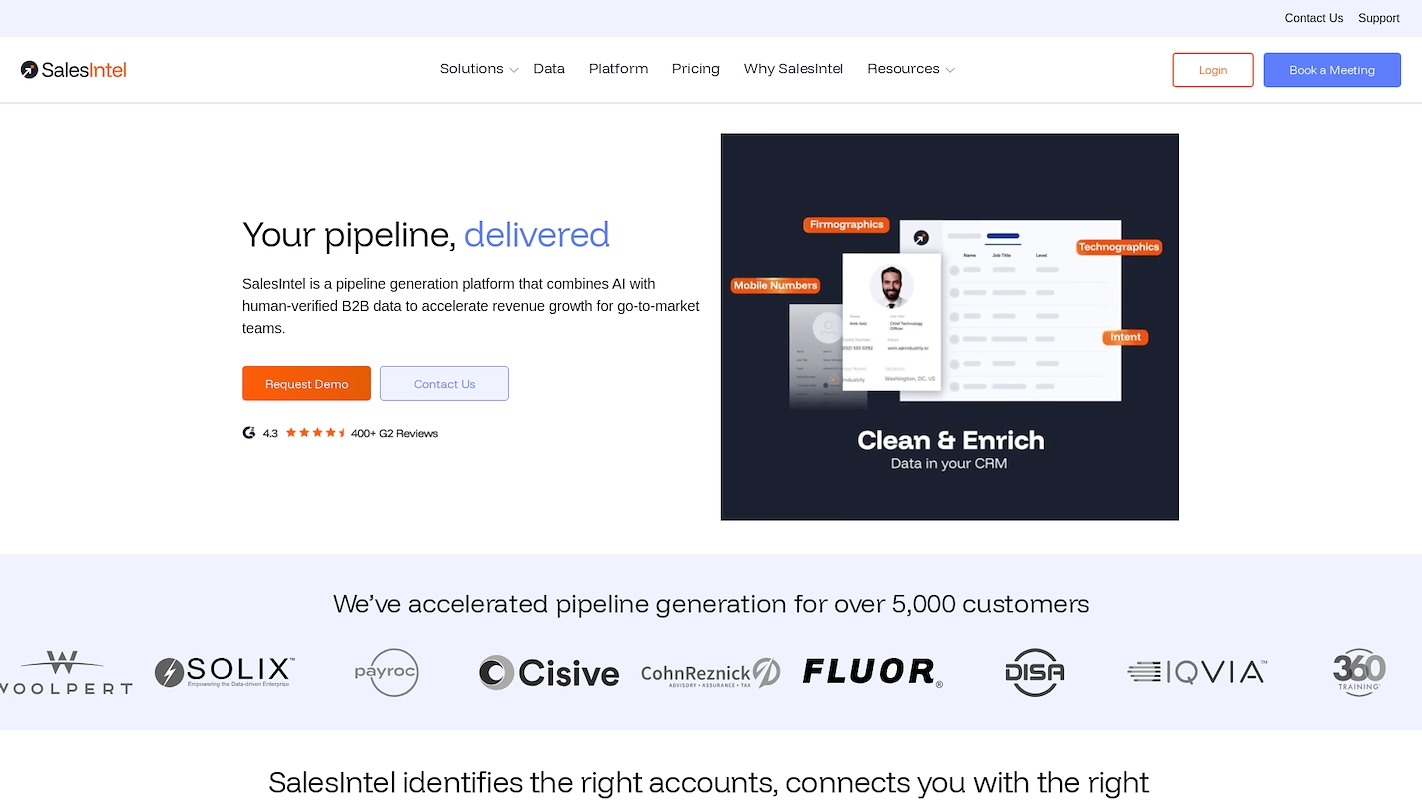
SalesIntel is a sales intelligence platform. It provides B2B contact and company data for sales and marketing teams. Users utilize the platform to build lists of prospects and find information for outreach.
The service focuses on data for business development. Teams can use the information to identify and research potential customers before they make contact.
SalesIntel's Main Features
- Provides human- and machine-verified contact data that is refreshed every 90 days.
- Identifies in-market buyers using real-time intent signals.
- Offers data cleaning and enrichment to keep CRM and marketing automation tools updated.
- Includes a visitor identification module to convert anonymous website visitors into leads.
SalesIntel vs. Reply Data
Average Review score: 4.3/5 stars based on 462 G2 reviews.
- SalesIntel provides human-verified contact data that is refreshed every 90 days. This approach to data accuracy is different from Reply Data's standard database model.
- The platform identifies in-market buyers using real-time intent signals. This provides a more proactive way to find leads compared to Reply Data's static database.
- It includes a visitor identification module to convert anonymous website visitors into leads, a feature that Reply Data does not have.
- The tool offers data cleaning and enrichment to keep CRM information updated. This differs from Reply Data, which focuses on providing data for initial outreach.
Where SalesIntel Can Fall Short
- SalesIntel does not include specialized email warmup or deliverability tools. Teams that run large email campaigns might need a separate service to manage sender reputation, unlike with Reply Data's integrated system.
- Its implementation time is around one month, according to user reviews. This is a longer setup period compared to Reply Data, which offers a more direct tool for teams with simple list-building needs.
- Some users mention that certain lists have higher email bounce rates. This can mean teams spend more time on data verification before outreach, a step that might be less frequent with Reply Data's more focused dataset.
Cost and Value Comparison
While we've covered key features and use cases in this comparison, pricing models can vary significantly between tools. For the most accurate and up-to-date pricing information, we recommend visiting SalesIntel's official website.
9) LeadIQ
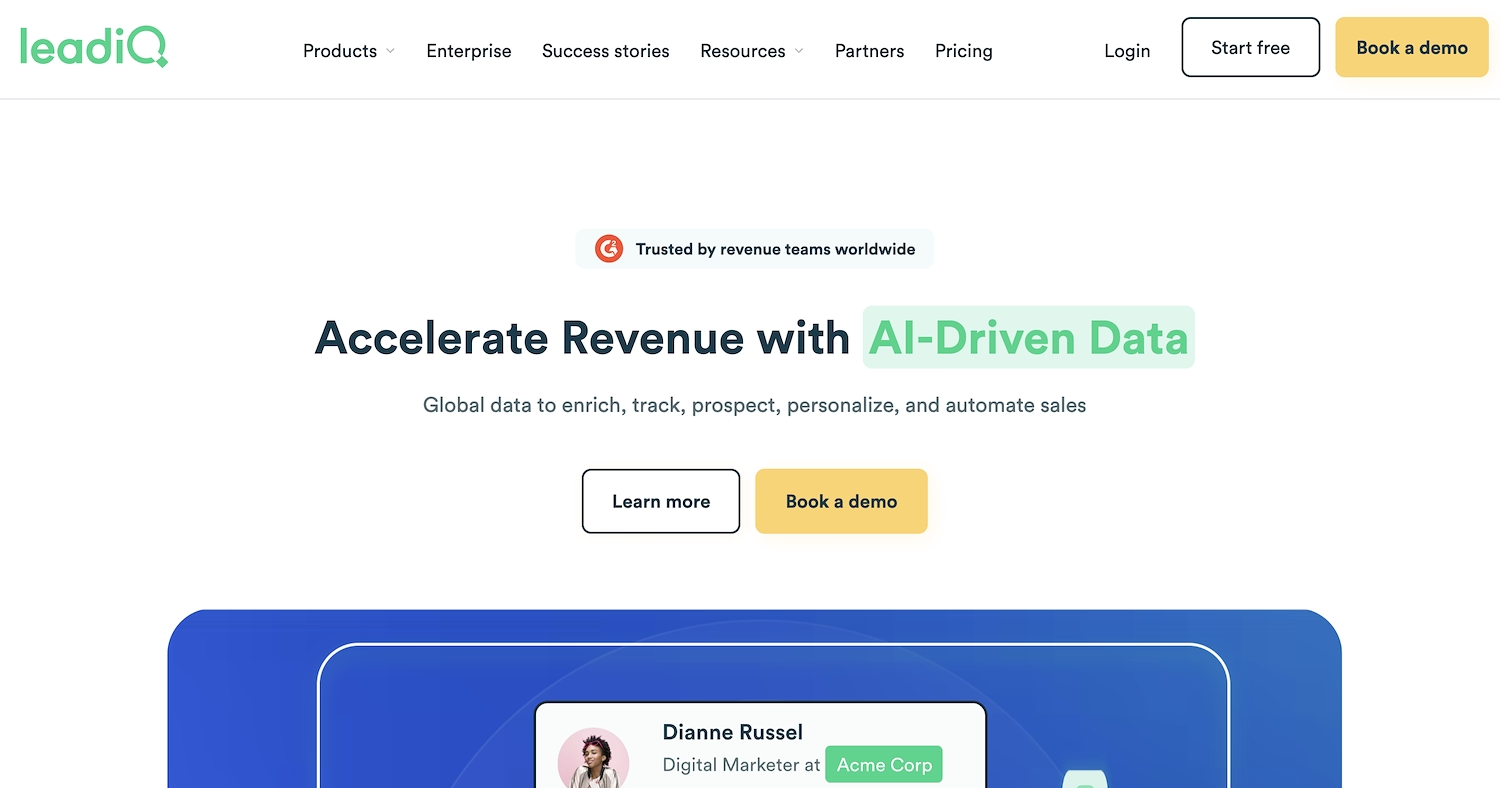
LeadIQ is a sales prospecting platform for B2B companies. Sales teams use it to find contact data and build accurate lead lists. The tool captures prospect information from professional networking sites and transfers it directly into a CRM, which provides data for outreach campaigns.
LeadIQ's Main Features
- Captures prospect data from professional networking sites and enriches it with contact information.
- Tracks sales triggers, such as job changes, to identify timely outreach opportunities.
- Includes tools to help personalize outreach messaging at scale.
- Transfers captured lead information directly into CRM and sales engagement platforms.
LeadIQ vs. Reply Data
Average Review score: 4.2/5 stars based on 1,097 G2 reviews.
- LeadIQ tracks sales triggers, such as job changes, to identify timely outreach opportunities. This is different from Reply Data, which provides a contact database without this specific monitoring feature.
- The platform captures prospect data directly from professional networking sites and transfers it to a CRM. This workflow differs from Reply Data, where users build lists primarily by searching its internal database.
- It includes tools to help personalize outreach messaging at scale, offering a layer of assistance not found in Reply Data's data-centric toolset.
- A free plan is available for basic use, which provides an entry point for individuals. In comparison, Reply Data structures its access around paid-only tiers.
Where LeadIQ Can Fall Short
- LeadIQ lacks built-in email warmup and deliverability management features. This is different from Reply Data, which provides these tools to help maintain sender reputation for large email campaigns.
- Its workflow focuses on capturing data from external sites. This process can be less direct for building large lists quickly compared to searching an internal database, which is the primary method in Reply Data.
- Some users note that the contact data can occasionally be inaccurate. This might require sales teams to spend additional time on verification before outreach, which can slow the prospecting process.
Cost and Value Comparison
LeadIQ offers a free plan and paid tiers starting at $45 per user per month, providing an accessible entry point for smaller teams. This contrasts with Reply Data's paid-only structure, which may be more suitable for teams that require predictable costs for high-volume use. For the most current pricing, we recommend visiting LeadIQ's official website.
10) Clearbit
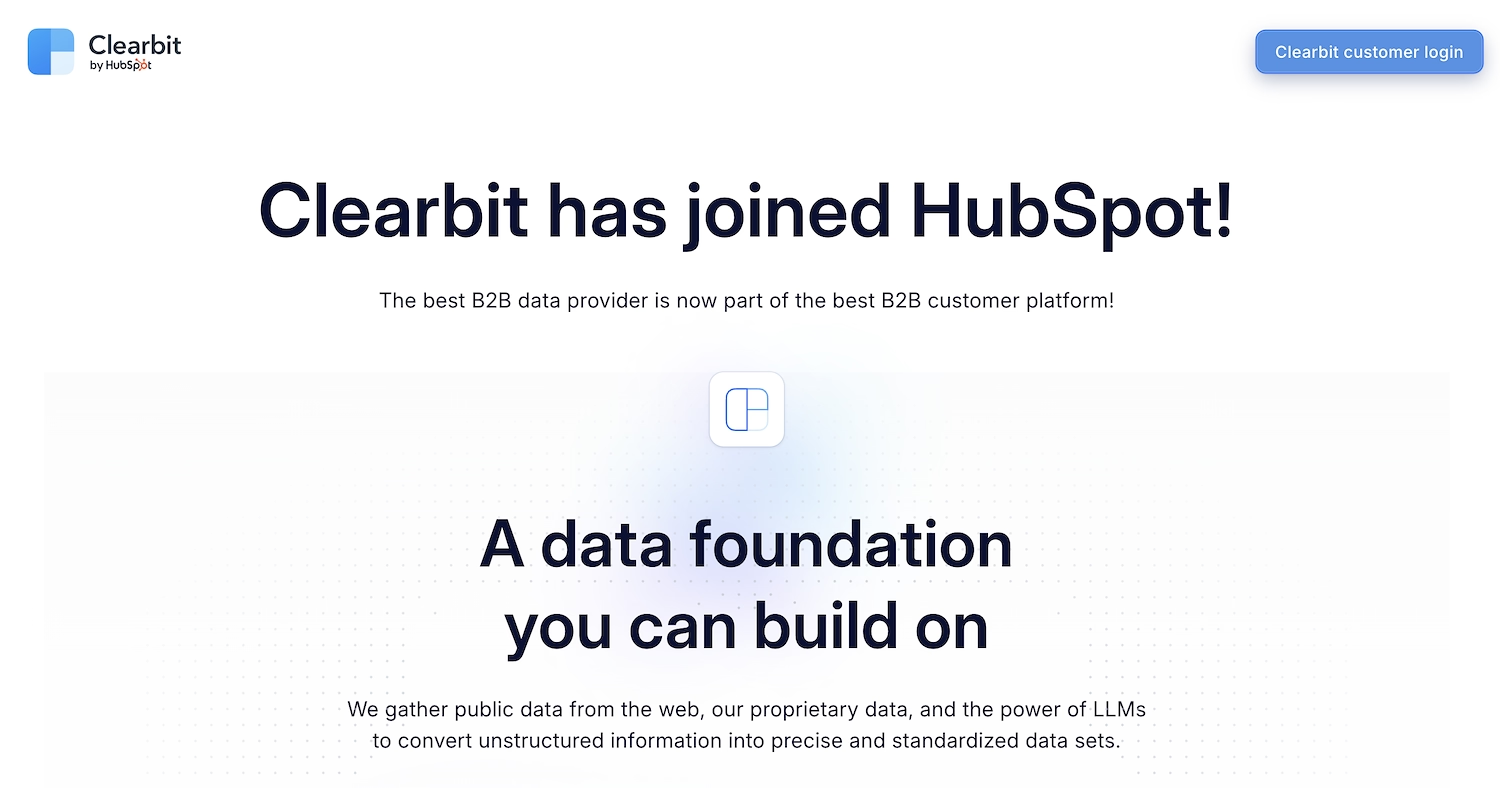
Clearbit is a marketing data platform for B2B companies. It uses a real-time data engine to provide contact and company information. Teams use the platform to enrich leads, understand their market, and personalize outreach. The data helps create a complete view of customers and prospects.
Clearbit's Main Features
- Appends over 100 data points to company and employee records.
- Identifies anonymous companies visiting a website and expressing intent.
- Integrates with CRM and marketing automation platforms to automate data workflows.
- Shortens website forms by hiding or autofilling known fields to increase conversions.
Clearbit vs. Reply Data
Average Review score: 4.4/5 stars based on 626 G2 reviews.
- Clearbit enriches records with over 100 data points. This provides a deeper profile of each lead compared to Reply Data, which focuses on providing contact information for list building.
- The tool identifies anonymous companies visiting a website. This creates new leads from web traffic, a feature not available in Reply Data.
- It can shorten website forms by autofilling fields for known visitors. This helps increase conversion rates, a function outside of Reply Data's outbound prospecting scope.
- The platform uses a real-time data engine to provide fresh information. This approach differs from Reply Data's more traditional database structure and aims to reduce outdated contacts.
Where Clearbit Can Fall Short
- Clearbit focuses on data enrichment and does not offer built-in email outreach tools. In contrast, Reply Data provides specialized features for email warmup and deliverability, which are important for managing large-scale campaigns.
- Its focus on broad marketing intelligence might be too complex for teams that only need a simple email finder. Reply Data provides a more direct toolset for list building, which can be easier to adopt for specific tasks.
- The tool's custom pricing is typically higher and may not suit all budgets. This is different from Reply Data's tiered plans, which provide more predictable costs for teams planning their expenses.
Cost and Value Comparison
While we've covered key features and use cases in this comparison, pricing models can vary significantly between tools. For the most accurate and up-to-date pricing information, we recommend visiting Clearbit's official website.
Which One Should You Go With?
The choice of a Reply Data alternative depends on many variables, from budget to specific feature needs. This guide shared several options to help you make an informed decision for your team.
If your team is open to a different approach, 11x uses autonomous agents to manage sales tasks like prospecting and outreach. This unified system can replace multiple tools in your current GTM stack, offering a consolidated option.




